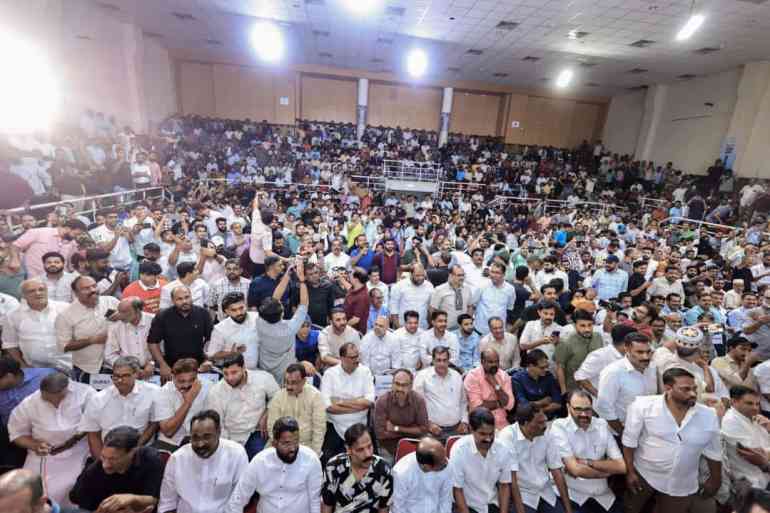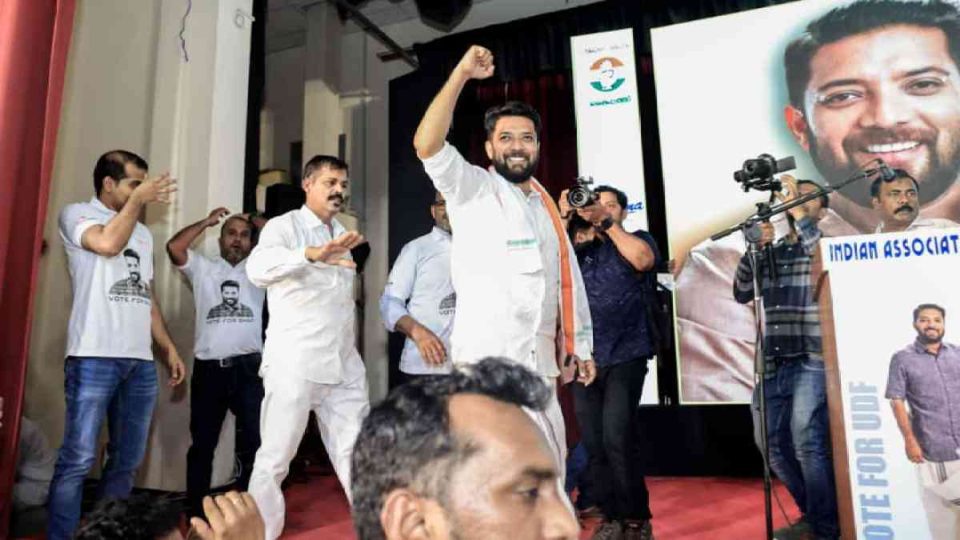Thiruvananthapuram, India – The hum of conversation gave way to a crescendo of loud political slogans in the packed auditorium as Shafi Parambil took the stage.
The 41-year-old Indian National Congress politician launched a vicious attack on Prime Minister Narendra Modi and Kerala Chief Minister Pinarayi Vijayan. “Every vote counts and I need your support wholeheartedly,” he said as he ended his speech.
It could have been a typical pre-election event – ahead of April 26, when the southern Indian state of Kerala votes in the country's second seven-phase national election – but it wasn't. Parambil was addressing supporters in Sharjah, United Arab Emirates, 2,800 km (1,739 miles) from Vadakara, the Kerala parliamentary seat he is contesting.
And he is not alone.
The Gulf region, which hosts more than 2 million immigrants from Kerala, is witnessing intense physical and virtual election campaigns, with contestants like Parambil vying for votes and community groups launching initiatives to help emigrants fly back to India to cast their votes.
Kerala Muslim Cultural Center (KMCC) is the largest Indian diaspora organization in the Persian Gulf with over 700,000 members. The group plans to fly back to Kerala with at least 10,000 members by Friday.
“We have asked our members who went home for Eid al-Fitr to stay back until the elections are over. Our campaign calling on eligible voters to come home and vote has seen (a) overwhelming response from our members. Now we have bulk booked flights to transport maximum people to Kerala,” KMCC Dubai branch secretary Hassan Chalil told Al Jazeera.
The KMCC is affiliated with the Indian Union Muslim League, a prominent political party in Kerala which is associated with the Congress – Parambil's party – both at the state and national levels. The Congress, which is the main national opposition party and also in opposition in Kerala, is one of the two major political forces in the state: the Communist Party of India (Marxist)-led Left Democratic Front (LDF), which is currently in power in Kerala. , is the other one.
The “election flights,” as KMCC officials describe them, began last week. “So far, many of our members have landed at Kannur, Kozhikode, Kochi and Thiruvananthapuram International Airports. The last flight with voters will leave Dubai on April 25,” Chalil said.
The group's units in Qatar, Oman, Bahrain, Saudi Arabia and Kuwait have also booked flights to take Kerala voters home. Some of these country chapters offer free tickets, while others promise significant discounts secured after negotiating with travel agencies.
Muhammed Niyas, an electrician in Kuwait, arrived in Vadkara on one of the “election flights” on 20 April. “Having missed the last two elections, I would like to vote this time because these elections will define the future of India. I want my country to remain secular,” Niyas told Al Jazeera, referring to concerns about the Hindu supremacy agenda being pushed by Modi and his Bharatiya Janata Party (BJP).
Last weekend, Modi referred to Muslims as “infiltrators” and “those who produce more children”, pandering to stereotypes not supported by his own government's data. Muslims make up 27 percent of Kerala's 35 million population, almost double the national average of 14 percent. Hindus make up 55 percent of the state's population and Christians 18 percent.
Abdul Jaleel, who took off from Dubai on Sunday, said almost all the passengers on his flight were from Kozhikode, his constituency.
“Everyone was excited to be part of the election. Our aim was to ensure a huge victory for our candidate,” said Jaleel. “I took a week off from my job to participate in the vote. I'll be back at work the next election day.”
Kerala an exception among the diaspora
Unlike many other countries, India does not have a vote in its overseas embassies. This means that members of the diaspora have to return to India to cast their vote.
Most don't. Of India's 13.4 million citizens living abroad, only 118,439 — less than 1 percent — registered to vote this year, according to the Election Commission of India. And only a fraction of them are likely to actually vote. Only 25,606 out of 99,844 expatriate voters took part in the last national elections in 2019.
Almost all of them were from Kerala.
Migrant rights campaigners say this is partly due to the nature of Kerala society, where a strong political culture means there are very few voters who are undecided or indifferent to elections. However, it is also the result of a concerted effort to garner the voices of a number of diaspora groups affiliated with various Indian political parties who help vulnerable migrants from Kerala when they need help.
When uninsured migrant workers need medical care, these community groups often step in to cover the costs. They help workers resolve labor disputes. Each of these organizations also has a wing dedicated to helping repatriate the bodies of migrants who died in the Persian Gulf.
The Congress party does this through entities such as the Overseas Indian Congress and the Indian Society for Culture and the Arts. Similarly, the Communist Party of India (Marxist) exercises its influence through a network of organisations, including Navodaya, Kairali, Keli, Kala, Dala, Sanskruti and Prathibha. These organizations also encourage their members to fly home to vote.
All 20 candidates representing the LDF participated in an online election convention held with voters in Kuwait during the second week of April. “The convention attracted over 3,000 compatriots from Kerala,” said TV Hikmat, leader of cultural organization Kala Kuwait.
Omani migrant rights activist Prime Minister Jabir told Al Jazeera that Kerala diaspora groups “provide immigrants with a platform to discuss politics and participate in the (democratic) electoral process”.
“The clothing also encourages expats to register as voters,” he said.
Parakkal Abdulla, a former member of the Kerala Legislative Assembly who now owns businesses in Qatar, believes that expatriates from the state are “fearing for the future of the country and that is why they are rushing home to vote”.
“Many Keralites in the Gulf countries believe that (India) has turned into an autocracy under Prime Minister Modi and they want to bring down his government,” Abdulla told Al Jazeera. Abdulla is currently in Kerala helping Parambil's campaign.
But the motivations of compatriots are not always purely political. For many, the election is a chance to reconnect with old friends – connections they sacrificed when they left home.
Since his arrival in Kerala earlier this month, Bhaskaran, an electrician who works in Qatar, has been campaigning for MV Balakrishnan, the Communist candidate from the Kasaragod constituency. Bhaskaran says he used to be active in local politics before he left for the Gulf in 2016.
“I'm here on a month's vacation. It is a great opportunity to renew your lost friendships and meet younger people. The interactions will give you new energy,” he told Al Jazeera.


NRIs are being 'denied' constitutional rights
Those who are unable to make “election flights” will not sit idle in the Persian Gulf either.
Farooq Hamadani, vice president of KMCC's Kuwait branch, said members of his organization who do not go home to vote are using technology and social media to find their candidates. “Our members will regularly call their friends and family members to secure votes for our party's candidates. We also have a social media cell to push content that is relevant to Kerala,” he said.
Diaspora organizations also help fund election campaigns in Kerala. In Vadakara's Nadapuram village, expatriate-funded hoardings feature Parambil, the Congress candidate, and KK Shylaja, his Communist opponent.
Migrant researchers say the practice of expats – whether individuals or community groups representing them – spending huge sums of money to exercise their voting rights does not bode well for the world's largest democracy. Irudaya Rajan, a migration expert and chairman of the Thiruvananthapuram-based International Institute for Migration and Development (IIMAD), said this actually discriminates against those who cannot travel to India during the elections.
“This is tantamount to denying the constitutional rights of the vast majority,” Rajan said.
According to experts, the best way to solve the problem is to introduce a remote voting mechanism. In 2017, the Government of India, on the recommendation of the Election Commission, introduced a bill in Parliament to allow Indian nationals abroad to appoint proxies to vote for them. Although the bill was passed in the lower house the next year, it failed in the Rajya Sabha, the upper house.
“India is heavily dependent on contributions from expatriates. So why are governments hesitant to involve them in electoral processes? Rajan asked.
India received $125 billion in remittances from emigrants in 2023 – the most of any nation.
“It should create a reliable system where they can vote from their host countries. It is the only way to give them their due,” said Rajan.

